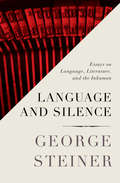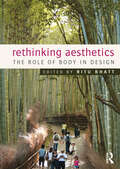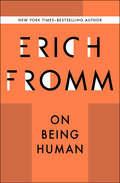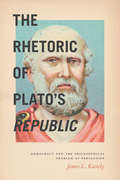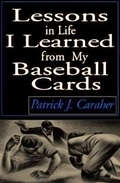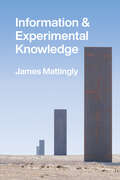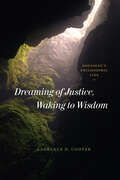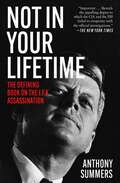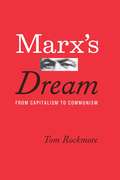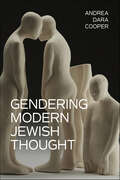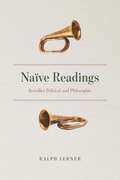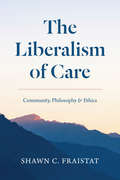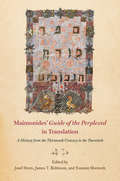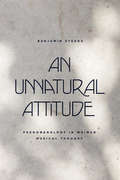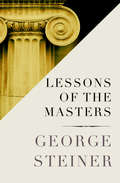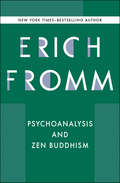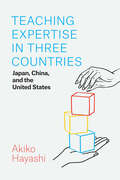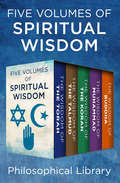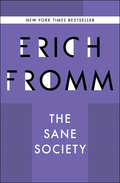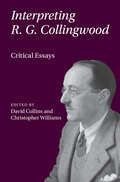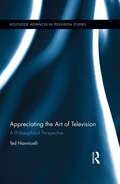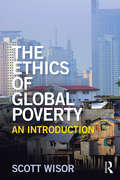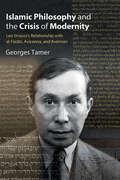- Table View
- List View
Language and Silence: Essays on Language, Literature, and the Inhuman (Peregrines Ser.)
by George SteinerThe evolution and manipulation of language from the celebrated author of After Babel. &“A keenly discriminating literary mind at work on what it loves&” (The New York Times Book Review).Language and Silence is a book about language—and politics, meaning, silence, and the future of literature. Originally published between 1958 and 1966, the essays that make up this collection ponder whether we have passed out of an era of verbal primacy and into one of post-linguistic forms—or partial silence. Steiner explores the idea of the abandonment of contemporary literary criticism, from the classics to the works of William Shakespeare, Lawrence Durell, Thomas Mann, Leon Trotsky, and more.
Rethinking Aesthetics: The Role of Body in Design
by Ritu BhattRethinking Aesthetics is the first book to bring together prominent voices in the fields of architecture, philosophy, aesthetics, and cognitive sciences to radically rethink the relationship between body and design. These essays argue that aesthetic experiences can be nurtured at any moment in everyday life, thanks to recent discoveries by researchers in neuroscience, phenomenology, somatics, and analytic philosophy of the mind, who have made the correlations between aesthetic cognition, the human body, and everyday life much clearer. The essays, by Yuriko Saito, Juhani Pallasmaa, and Richard Shusterman, among others, range from an integrated mind-body approach to chair design, to Zen Buddhist notions of mindfulness, to theoretical accounts of existential relationships with buildings, to present a full spectrum of possible inquiries. By placing the body in the center of design, Rethinking Aesthetics opens new directions for rethinking the limits of both essentialism and skepticism.
On Being Human
by Erich FrommAn insightful look at alienation in the modern world from the New York Times–bestselling author of The Art of Loving and Escape from Freedom. Social psychologist Erich Fromm observed the spread of alienation in the 1960s, arguing that humans who were once dynamic, creative beings were reduced to fixating on TV screens, emotionally paralyzed by anxieties over threats like nuclear war. Though we may stare at different devices and worry about other dangers today, his insights are as useful as ever, and allow us to gain perspective on the human condition. A collection of his writings on &“New Humanism&” and the need to reclaim our happiness and peace of mind, this is a thoughtful, fascinating overview of the past that shaped us, and the philosophies and practices that can ensure a better future, both for ourselves and for the world at large. Included are reflections on thinkers from Karl Marx to medieval Catholic mystic Meister Eckhart, as &“Fromm&’s large, keen mind and attractive, likable voice [strive] for heart as he asks himself the hardest questions of his day&” (Kirkus Reviews). This ebook features an illustrated biography of Erich Fromm including rare images and never-before-seen documents from the author&’s estate.
The Rhetoric of Plato's Republic: Democracy and the Philosophical Problem of Persuasion
by James L. KastelyPlato isn’t exactly thought of as a champion of democracy, and perhaps even less as an important rhetorical theorist. In this book, James L. Kastely recasts Plato in just these lights, offering a vivid new reading of one of Plato’s most important works: the Republic. At heart, Kastely demonstrates, the Republic is a democratic epic poem and pioneering work in rhetorical theory. Examining issues of justice, communication, persuasion, and audience, he uncovers a seedbed of theoretical ideas that resonate all the way up to our contemporary democratic practices. As Kastely shows, the Republic begins with two interrelated crises: one rhetorical, one philosophical. In the first, democracy is defended by a discourse of justice, but no one can take this discourse seriously because no one can see—in a world where the powerful dominate the weak—how justice is a value in itself. That value must be found philosophically, but philosophy, as Plato and Socrates understand it, can reach only the very few. In order to reach its larger political audience, it must become rhetoric; it must become a persuasive part of the larger culture—which, at that time, meant epic poetry. Tracing how Plato and Socrates formulate this transformation in the Republic, Kastely isolates a crucial theory of persuasion that is central to how we talk together about justice and organize ourselves according to democratic principles.
Lessons in Life I Learned from My Baseball Cards
by Patrick J. CaraherRemember when the most exciting moment of your childhood was opening a fresh pack of baseball cards? How you gazed lovingly at the pictures of your heroes, pored over their statistics, thrilled to their exploits and identified with their lives? We all know someone whose baseball card collection was the most significant touchstone of his childhood. Baseball card collector Patrick Caraher has turned his lifelong passion into a spiritual odyssey in Lessons in Life I Learned from Baseball Cards. Selecting some prize items from his collection, Caraher has reflected on their larger resonance and produced this little gem of a book, the sports equivalent of Everything I Need to Know I Learned in Kindergarten. With deft cameos of stars whose admirable lives and careers characterized such virtues as fortitude, humility, determination, honesty, and decency, Caraher has breathed life into the statistics behind baseball's role models and produced a collection of miniature portraits that illuminates the national pastime as few other books have.
Information & Experimental Knowledge
by James MattinglyAn ambitious new model of experimentation that will reorient our understanding of the key features of experimental practice. What is experimental knowledge, and how do we get it? While there is general agreement that experiment is a crucial source of scientific knowledge, how experiment generates that knowledge is far more contentious. In this book, philosopher of science James Mattingly explains how experiments function. Specifically, he discusses what it is about experimental practice that transforms observations of what may be very localized, particular, isolated systems into what may be global, general, integrated empirical knowledge. Mattingly argues that the purpose of experimentation is the same as the purpose of any other knowledge-generating enterprise—to change the state of information of the knower. This trivial-seeming point has a non-trivial consequence: to understand a knowledge-generating enterprise, we should follow the flow of information. Therefore, the account of experimental knowledge Mattingly provides is based on understanding how information flows in experiments: what facilitates that flow, what hinders it, and what characteristics allow it to flow from system to system, into the heads of researchers, and finally into our store of scientific knowledge.
Dreaming of Justice, Waking to Wisdom: Rousseau's Philosophic Life
by Laurence D. CooperA surprising look at how Rousseau defended the philosophic life as the most natural and best of lives. Dreaming of Justice, Waking to Wisdom reveals what could be thought of as the capstone of Rousseau’s thought, even if that capstone has been nearly invisible to readers. Despite criticizing philosophy for its corrosive effects on both natural goodness and civic virtue, Rousseau, argues Laurence D. Cooper, held the philosophic life as an ideal. Cooper expertly unpacks Rousseau’s vivid depiction of the philosophic life and the case for that life as the most natural, the freest, or, in short, the best or most choice-worthy of lives. Cooper focuses especially on a single feature, arguably the defining feature of the philosophic life: the overcoming of the ordinary moral consciousness in favor of the cognitivist view of morality. Cooper shows that Rousseau, with his particular understanding and embrace of the philosophic life, proves to be a kind of latter-day Socratic. Thorough and thought-provoking, Dreaming of Justice, Waking to Wisdom provides vital insight into Rousseau.
Not in Your Lifetime: The Defining Book on the J.F.K. Assassination
by Anthony SummersUpdated with the latest evidence, Pulitzer Prize finalist Anthony Summers&’s essential, acclaimed account of President Kennedy&’s assassination. Almost sixty years after the assassination of John F. Kennedy, most Americans still think they have not been told the truth about his death. Chief Justice Earl Warren, who chaired the first inquiry, said &“some things&” that &“involve security&” might not be released in the lifetime of the then public. Millions of pages of assassination records were made public since the late 1990s. As of 2022, however, more than thirteen thousand declassified documents—most of them from CIA records—still contain redactions. President Biden ordered that all documents be released in December of 2022—unless he sanctions continued secrecy. Anthony Summers&’s account of the murder mystery that haunts America is one of the finest books on the assassination. &“An awesome work, with the power of a plea as from Zola for justice.&” —Los Angeles Times &“The closest we have to that literary chimera, a definitive work on the events in Dallas.&” —The Boston Globe
Marx's Dream: From Capitalism to Communism
by Tom RockmoreTwo centuries after his birth, Karl Marx is read almost solely through the lens of Marxism, his works examined for how they fit into the doctrine that was developed from them after his death. With Marx’s Dream, Tom Rockmore offers a much-needed alternative view, distinguishing rigorously between Marx and Marxism. Rockmore breaks with the Marxist view of Marx in three key ways. First, he shows that the concern with the relation of theory to practice—reflected in Marx’s famous claim that philosophers only interpret the world, while the point is to change it—arose as early as Socrates, and has been central to philosophy in its best moments. Second, he seeks to free Marx from his unsolicited Marxist embrace in order to consider his theory on its own merits. And, crucially, Rockmore relies on the normal standards of philosophical debate, without the special pleading to which Marxist accounts too often resort. Marx’s failures as a thinker, Rockmore shows, lie less in his diagnosis of industrial capitalism’s problems than in the suggested remedies, which are often unsound. ? Only a philosopher of Rockmore’s stature could tackle a project this substantial, and the results are remarkable: a fresh Marx, unencumbered by doctrine and full of insights that remain salient today.
Gendering Modern Jewish Thought (New Jewish Philosophy and Thought)
by Andrea Dara CooperThe idea of brotherhood has been an important philosophical concept for understanding community, equality, and justice. In Gendering Modern Jewish Thought, Andrea Dara Cooper offers a gendered reading that challenges the key figures of the all-male fraternity of twentieth-century Jewish philosophy to open up to the feminine.Cooper offers a feminist lens, which when applied to thinkers such as Franz Rosenzweig and Emmanuel Levinas, reveals new ways of illuminating questions of relational ethics, embodiment, politics, and positionality. She shows that patriarchal kinship as models of erotic love, brotherhood, and paternity are not accidental in Jewish philosophy, but serve as norms that have excluded women and non-normative individuals.Gendering Modern Jewish Thought suggests these fraternal models do real damage and must be brought to account in more broadly humanistic frameworks. For Cooper, a more responsible and ethical reading of Jewish philosophy comes forward when it is opened to the voices of mothers, sisters, and daughters.
Naïve Readings: Reveilles Political and Philosophic
by Ralph LernerOne sure fact of humanity is that we all cherish our opinions and will often strongly resist efforts by others to change them. Philosophers and politicians have long understood this, and whenever they have sought to get us to think differently they have often resorted to forms of camouflage that slip their unsettling thoughts into our psyche without raising alarm. In this fascinating examination of a range of writers and thinkers, Ralph Lerner offers a new method of reading that detects this camouflage and offers a way toward deeper understandings of some of history’s most important—and most concealed—messages. Lerner analyzes an astonishing diversity of writers, including Francis Bacon, Benjamin Franklin, Edward Gibbon, Judah Halevi, Thomas Jefferson, Abraham Lincoln, Moses Maimonides, and Alexis de Tocqueville. He shows that by reading their words slowly and naïvely, with wide-open eyes and special attention for moments of writing that become self-conscious, impassioned, or idiosyncratic, we can begin to see a pattern that illuminates a thinker’s intent, new messages purposively executed through indirect means. Through these experimental readings, Lerner shows, we can see a deep commonality across writers from disparate times and situations, one that finds them artfully challenging others to reject passivity and fatalism and start thinking afresh.
The Liberalism of Care: Community, Philosophy, & Ethics
by Shawn C. FraistatAttention to care in modern society has fallen out of view as an ethos of personal responsibility, free markets, and individualism has taken hold. The Liberalism of Care argues that contemporary liberalism is suffering from a crisis of care, manifest in a decaying sense of collective political responsibility for citizens’ well-being and for the most vulnerable members of our communities. Political scientist Shawn C. Fraistat argues that we have lost the political language of care, which, prior the nineteenth century, was commonly used to express these dimensions of political life. To recover that language, Fraistat turns to three prominent philosophers—Plato, Jean-Jacques Rousseau, and William Godwin—who illuminate the varied ways caring language and caring values have structured core debates in the history of Western political thought about the proper role of government, as well as the rights and responsibilities of citizens. The Liberalism of Care presents a distinctive vision for our liberal politics where political communities and citizens can utilize the ethic and practices of care to face practical challenges.
Maimonides' "Guide of the Perplexed" in Translation: A History from the Thirteenth Century to the Twentieth
by Josef Stern James T. Robinson Yonatan ShemeshMoses Maimonides’s Guide of the Perplexed is the greatest philosophical text in the history of Jewish thought and a major work of the Middle Ages. For almost all of its history, however, the Guide has been read and commented upon in translation—in Hebrew, Latin, Spanish, French, English, and other modern languages—rather than in its original Judeo-Arabic. This volume is the first to tell the story of the translations and translators of Maimonides’ Guide and its impact in translation on philosophy from the Middle Ages to the present day. A collection of essays by scholars from a range of disciplines, the book unfolds in two parts. The first traces the history of the translations of the Guide, from medieval to modern renditions. The second surveys its influence in translation on Latin scholastic, early modern, and contemporary Anglo-American philosophy, as well as its impact in translation on current scholarship. Interdisciplinary in approach, this book will be essential reading for philosophers, historians, and religious studies scholars alike.
An Unnatural Attitude: Phenomenology in Weimar Musical Thought (New Material Histories of Music)
by Benjamin SteegeAn Unnatural Attitude traces a style of musical thought that coalesced in the intellectual milieu of the Weimar Republic—a phenomenological style that sought to renew contact with music as a worldly circumstance. Deeply critical of the influence of naturalism in aesthetics and ethics, proponents of this new style argued for the description of music as something accessible neither through introspection nor through experimental research, but rather in an attitude of outward, open orientation toward the world. With this approach, music acquires meaning in particular when the act of listening is understood to be shared with others. Benjamin Steege interprets this discourse as the response of a young, post–World War I generation amid a virtually uninterrupted experience of war, actual or imminent—a cohort for whom disenchantment with scientific achievement was to be answered by reasserting the value of imaginative thought. Steege draws on a wide range of published and unpublished texts from music theory, pedagogy, criticism, and philosophy of music, some of which appear for the first time in English translation in the book’s appendixes. An Unnatural Attitude considers the question: What are we thinking about when we think about music in non-naturalistic terms?
Lessons of the Masters (The\charles Eliot Norton Lectures #51)
by George SteinerA thought-provoking examination of the complex teacher-student relationship, from one of the great minds of the modern literary worldBased on George Steiner&’s extensive experience as a teacher, Lessons of the Masters is a passionate examination of the &“profession of the professor.&” He writes about what empowers one person to teach another, and explores the complexities and nuances of this bond. From the charismatic master to the loving disciple, Steiner explores the religious, philosophical, economic, and scientific aspects of imparting knowledge, drawing upon history&’s most famous teachers: Socrates, Jesus, Faust, Virgil, Dante, Heloise, and Abelard.
Psychoanalysis and Zen Buddhism (Condor Bks.)
by Erich FrommThe renowned psychoanalyst and New York Times–bestselling author of The Art of Loving unites philosophy from the East and West. In 1957, social philosopher and psychoanalyst Erich Fromm invited Daisetz T. Suzuki, the most famous Zen Buddhist master in the Western world, to a seminar at his new home in Cuernavaca, Mexico. Their discussion was one of the highlights of Fromm&’s life, and the paper Fromm presented (and later expanded into a book) was a watershed work. Fromm demonstrates his mastery of the philosophy and practice of Zen, perfectly articulating how Zen tenets fit into the ideas of psychoanalysis. In this text, he creates new perspectives on both systems of thought. This ebook features an illustrated biography of Erich Fromm including rare images and never-before-seen documents from the author&’s estate.
Teaching Expertise in Three Countries: Japan, China, and the United States
by Akiko HayashiA comparison of the development of expertise in preschool teaching in China, Japan, and the United States. In Teaching Expertise in Three Countries, Akiko Hayashi shows how teachers from Japan, China, and the United States think about what it means to be an expert teacher. Based on interviews with teachers conducted over the span of fifteen years and videos taken in their classrooms, Hayashi gives us a valuable portrait of expert teachers in the making. While Hayashi’s research uncovered cultural variations in the different national contexts, her analysis of how teachers adapted their pedagogy throughout their careers also revealed many cross-national similarities. Younger teachers often describe themselves as being in a rush, following scripts, and “talking too much,” while experienced teachers describe themselves as being quieter, knowing children better, and being more present. Including a foreword by scholar of early childhood education Joseph Tobin, Teaching Expertise in Three Countries provides a foundation for understanding the sequence and pathways of development over the first decade of teaching in three national contexts, demonstrating the value of the field of comparative education in the process.
Five Volumes of Spiritual Wisdom: The Wisdom of the Torah, The Wisdom of the Talmud, The Wisdom of the Koran, The Wisdom of Muhammad, and The Wisdom of Buddha (Wisdom)
by The Wisdom SeriesA stunning collection of ancient wisdom featuring powerful insights from five of the world&’s most influential religions.The Wisdom of the Torah is an instruction in the central beliefs of three world religions: Judaism, Christianity, and Islam. But by observing the Torah, or the Hebrew Bible, as a collected work of multiple authors spanning generations, the modern reader can look beyond its fundamental instruction. In these works, readers find many lyrical and timeless reflections on what it means to have faith and to be a member of the human race. The Wisdom of the Talmud presents a thorough history and overview of the Talmud, the rabbinical commentary on the Torah that was developed in the Jewish academies of Palestine and Babylonia. From man&’s purpose and miracles to marriage and wellness to consciousness and community, the Talmud considers what it means to practice faith on a daily basis and through a changing world. In The Wisdom of the Koran, readers will discover a selection of key chapters such as &“The Night Journey&” and &“The Cave,&” footnotes to convey context and meaning, as well as several stories from Judeo-Christian history. This invaluable anthology is an excellent step toward greater understanding of one of the finest pieces of Arabic prose and the Muslim faith. The Wisdom of Muhammad is essential reading for anyone who wants to have a true understanding of Islam, and offers a compelling examination of the life and sayings of the Prophet. Covering a diverse range of topics, from marriage and civic charity to the individual&’s relationship to God and the afterlife, the Prophet&’s words dispel misconceptions about the history of the faith, its leader, and its core beliefs. The Wisdom of Buddha, drawn from the sacred books of Buddhism, reveals the insights and beliefs at the heart of the world&’s fourth-largest religion. Covering the birth and death of the Buddha, as well as the major tenets of Buddhism, this collection offers a profound view of the Buddhist religion and its founder. These five volumes from Philosophical Library&’s groundbreaking Wisdom series are available in one volume for the first time.
The Sane Society (Psicologia Y Psicoan Ser.)
by Erich FrommA New York Times bestseller about overcoming the profound ills of modern society by a legendary social psychologist, the author of Escape from Freedom. One of Fromm&’s main interests was to analyze social systems and their impact on the mental health of the individual. In this study, he reaches further and asks: &“Can a society be sick?&” He finds that it can, arguing that Western culture is immersed in a &“pathology of normalcy&” that affects the mental health of individuals. In The Sane Society, Fromm examines the alienating effects of modern capitalism, and discusses historical and contemporary alternatives, particularly communitarian systems. Finally, he presents new ideas for a re-organization of economics, politics, and culture that would support the individual&’s mental health and our profound human needs for love and freedom. This ebook features an illustrated biography of Erich Fromm including rare images and never-before-seen documents from the author&’s estate.
Jesus and the Genome: The Intersection of Christology and Biology
by Michael L. Peterson Timothy J. Pawl Ben F. BrammellIs a coherent worldview that embraces both classical Christology and modern evolutionary biology possible? This volume explores this fundamental question through an engaged inquiry into key topics, including the Incarnation, the process of evolution, modes of divine action, the nature of rationality, morality, chance and love, and even the meaning of life. Grounded alike in the history and philosophy of science, Christian theology, and the scientific basis for evolutionary biology and genetics, the volume discusses diverse thinkers, both medieval and modern, ranging from Augustine and Aquinas to contemporary voices like Richard Dawkins and Michael Ruse. Aiming to show how a biologically informed Christian worldview is scientifically, theologically, and philosophically viable, it offers important perspectives on the worldview of evolutionary naturalism, a prominent perspective in current science–religion discussions. The authors argue for the intellectual plausibility of a comprehensive worldview perspective that embraces both Christology and evolution biology in intimate relationship.
Interpreting R. G. Collingwood: Critical Essays
by David Collins Christopher WilliamsAn indisputably prominent figure in twentieth-century philosophy, R. G. Collingwood often remains elusive even to those who admire his achievements. This volume of new essays aims to reintroduce Collingwood to twenty-first-century philosophical readers and to show why, and how, his achievements matter. Each essay offers an original contribution to the understanding of some aspect of Collingwood's thought, including new interpretations of several of his central ideas, re-examinations of his place in twentieth-century philosophy, and an extended consideration of a previously undiscussed manuscript. The essays span the wide range of Collingwood's interests, including metaphysics, epistemology, logic, philosophy of mind, aesthetics, and political philosophy, as well as Roman British history and the history of art. Emphasis is placed on Collingwood's connections to traditions with which his name is not typically linked, including pragmatism, analytic philosophy, and phenomenology. This rich volume will stimulate further examination of Collingwood and his legacy.
Samriddhi Ka Marg, Samriddhi Ke Aath Stambh, Bhagya Ki Maharat: समृद्धि का मार्ग, समृद्धि के आठ स्तंभ, भाग्य की महारत
by James Allenसमृद्धि का मार्ग, समृद्धि के आठ स्तंभ, भाग्य की महारत एक प्रेरक और विचारशील पुस्तक है, जो आत्म-संवर्धन और जीवन में संतुलन बनाने का रास्ता दिखाती है। जेम्स एलन ने इसे चार भागों में विभाजित किया है, जहां वे समृद्धि के सिद्धांत, आत्मनियंत्रण, आंतरिक शांति और सकारात्मक सोच के महत्व को रेखांकित करते हैं। पुस्तक यह सिखाती है कि विचारों की शक्ति और कर्म के सिद्धांतों को समझकर न केवल बाहरी सफलता, बल्कि आंतरिक शांति और स्थायी खुशी भी पाई जा सकती है। समृद्धि के आठ स्तंभों (ऊर्जा, अखंडता, प्रणाली, सहानुभूति आदि) पर विशेष जोर देते हुए यह मार्गदर्शन करती है कि कैसे हर व्यक्ति अपने जीवन को नई ऊंचाइयों तक ले जा सकता है। यह कृति मानसिक और आध्यात्मिक विकास की दिशा में प्रेरणा का स्रोत है।
Appreciating the Art of Television: A Philosophical Perspective (Routledge Advances in Television Studies)
by Ted NannicelliContemporary television has been marked by such exceptional programming that it is now common to hear claims that TV has finally become an art. In Appreciating the Art of Television, Nannicelli contends that televisual art is not a recent development, but has in fact existed for a long time. Yet despite the flourishing of two relevant academic subfields—the philosophy of film and television aesthetics—there is little scholarship on television, in general, as an art form. This book aims to provide scholars active in television aesthetics with a critical overview of the relevant philosophical literature, while also giving philosophers of film a particular account of the art of television that will hopefully spur further interest and debate. It offers the first sustained theoretical examination of what is involved in appreciating television as an art and how this bears on the practical business of television scholars, critics, students, and fans—namely the comprehension, interpretation, and evaluation of specific televisual artworks.
The Ethics of Global Poverty: An introduction (The Ethics of ...)
by Scott WisorThe Ethics of Global Poverty offers a thorough introduction to the ethical issues surrounding global poverty. It addresses important questions such as: What is poverty and how is it measured? What are the causes of poverty? Do wealthy individuals have a moral duty to reduce global poverty? Should aid go to those who are most in need, or to those who are easiest to help? Is it morally wrong to buy from sweatshops? Is it morally good to provide micro-finance? Featuring case studies throughout, this textbook is essential reading for students studying global ethics or global poverty who want an understanding of the moral issues that arise from vast inequalities of wealth and power in a highly interconnected world.
Islamic Philosophy and the Crisis of Modernity: Leo Strauss's Relationship with al-Fārābī, Avicenna, and Averroes (SUNY series in the Thought and Legacy of Leo Strauss)
by Georges TamerThis study examines the impact of the medieval Muslim philosophers al-Fārābī, Ibn Sīnā (Avicenna) and Ibn Rushd (Averroes) on Leo Strauss. Through meticulous source analysis, Georges Tamer critically evaluates Strauss's interpretation of their works. Furthermore, he explores how Islamic philosophy shaped Strauss's understanding of Maimonides and Plato, providing a compelling solution to the modernity crisis he identified. Offering fresh perspectives on the evolution of Strauss's thought and his distinctive approach to Arabic sources, Tamer sheds light on the pivotal role of al-Fārābī, the most significant Muslim philosopher in Strauss's view, including key aspects of al-Fārābī's political philosophy and his nuanced take on Plato's ideas. Islamic Philosophy and the Crisis of Modernity is a valuable addition to current scholarship on Strauss. Both philosophically erudite and philologically rigorous, Tamer presents the reader with a balanced perspective on Strauss's insights without being overly reverential or dismissive.
